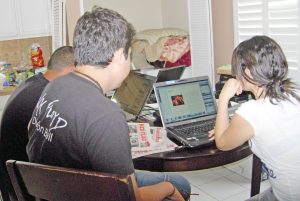
August 3, 2025— Red Flag/Bandera Roja matters. “We fight for communism and nothing less.” This is not just a slogan but a strikingly new program. It’s about how we organize. The way we work. We are still learning while we are teaching.
The main way that our international party figures this out collectively is through RF/BR. How we do RF/BR matters.
Here’s a contradiction: On one side, we are committed (at least in theory) to developing a new kind of communist paper. On the other side, in practice, we are not very clear about how we should be doing this. I don’t feel I have communicated my thoughts about this well enough, and I am still trying to think it through.
This discussion is intended to strengthen our commitment by gaining more clarity about how our practice around RF/BR should change.
We suggest that the “new kind of communist paper” will be one where the analysis and theory are grounded as firmly as possible in the practical work of mobilizing masses for communism. Our line and the way we present it develop through this work. In conversations among friends and comrades. In the thick of the class struggle.
As one comrade put it, “our best articles model introducing communist ideas in a social setting with interactions between activists.”
A powerful example: INDIA, December 3— “When I saw the El Salvador garment workers’ article in Red Flag about wage slavery in Bangladesh,” said a comrade, “I immediately called a garment worker in Dhaka. She had been getting Red Flag. I asked her about the strike. She said that with the war in Gaza, many workers are thinking of linking the struggle internationally. We are all wage slaves.” Our Bengaluru collective met at a safe place to discuss the revolutionary potential all around the Middle East. And this was just the first paragraph.
Other examples: The article from El Salvador explaining dialectical materialism in the context of discussions in a garment factory. The sharp discussion about class analysis versus nationalism in the article about the South Africa Youth Day meeting.
In writing about our work, comrades come to understand our politics better. To become more skillful at explaining them. The work of writing and editing collectively is not a waste of anyone’s time. It’s a necessary part of the political development of comrades, collectives, and the party itself.
Doing this isn’t easy. I struggle with it like everyone else. For example, a letter about an anti-ICE “Community Defense Center” I’m involved with. I took the first draft to a friend there, a leader who likes RF and encourages others to read it. He suggested some good changes which I made. But the second draft was still too much “show and tell” and not enough about communism. I took out a secondary anecdote and added instead a little about how the CDC reflects communist values. When my friend saw it in print, he liked it better.
RF/BR is not always clear enough about where differences in practice reflect or become disagreements about our line. More letters could help with this. More writers certainly would. More comrades participating in the editorial process, locally or in the editorial collective.
Still, as a comrade wrote recently, “one size doesn’t fit all.” Letters can have more varied approaches. A very useful recent TV review included friends’ comments, but it wasn’t basically grounded in the work. We hope this younger comrade and others write more like this.
Sometimes major class struggles or developments in inter-imperialist conflict need a more traditional expository style. There is a continuing discussion about how AI can be useful (or not) in helping to generate these. But we must always be aware of our main audience: new comrades and their friends around the world. And what they can learn about communism – beyond slogans – from our articles.

